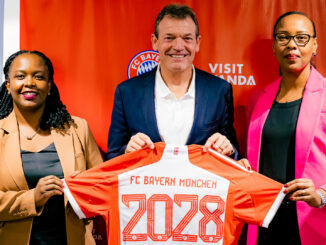
Women’s soccer has had an incredible year globally. The 2019 FIFA Women’s World Cup was a resounding success both on and off the field, with the United States national team defending their title in Lyon and becoming household names for their activism for gender equality in society. What followed was a year where female players used their sporting platform to push for greater recognition and investment into the women’s game. Top-flight players in Spain and Italy are now recognized as professionals, Japan is starting a full-time professional league in 2021, and the English FA Women’s Super League is finally flexing its financial muscle to lure world-class international players. The momentum was barely dented by the COVID-19 shutdown, with celebrities such as Natalie Portman and Serena Williams just recently investing into a new, independent women’s club in Los Angeles.
On the field, the product has been outstanding. Sam Kerr, the Australian superstar, earned a big-money move to Chelsea and immediately won the league with her new teammates. Lyon, arguably the best women’s club in the world, still has Norwegian forward Ada Hegerberg and German No. 10 Dzsenifer Marozsán for their Women’s Champions League title defense. Across the pond, the National Women’s Soccer League became the first American team sports to return from shutdown and saw English striker Rachel Daly lead the perennial underdogs Houston Dash to the Challenge Cup championship.
But what about in Germany? Here at Bundesliga Fanatic, we strive to represent all fans of all Bundesligen, and the Frauen-Bundesliga has strong teams and some of the best players in the world right now. Just like its men’s counterpart, die Liga is a stable league that offers consistently entertaining matches and a bit more parity than say, for example, the French or Italian leagues. And like the rest of the world, German women’s soccer has also accelerated in the past year, with exciting and seismic changes happening this off-season. There has never been a more perfect time to start watching the women’s game, and here are three storylines for the upcoming season to convert you into a “Frauen-Bundesliga fanatic”:
How quickly can Wolfsburg and Bayern integrate their new signings for the Champions League restart?
Like the men’s, the 2019–20 UEFA Women’s Champions League was interrupted by the COVID-19 shutdown and will be played now as a single-elimination tournament from the quarter-finals onward. Unlike the men’s, however, clubs will be able to register up to six new players (no more than three from the other quarter-finalists) for the restart, which offers endless intriguing scenarios among the rivals. While there was criticism of impaired sporting integrity, the smaller squad sizes and the financial impracticality for extending expiring players’ contracts in the women’s game necessitated this rule.
Both German representatives, VfL Wolfsburg and Bayern Munich, remain in the competition on opposite sides of the bracket, so an all-German final is still possible. Wolfsburg, two-time Champions League winners, have one of the deepest squads in Europe and are favored to reach the final, though they must do so with a suspect central defense and either an inexperienced or an unfamiliar goalkeeper after Hedvig Lindahl left for fellow quarter-finalist Atlético Madrid. (Wolfsburg’s No. 1, Almuth Schult, remains on maternity leave.) Lindahl’s replacement is most likely to be new signing Katarzyna Kiedrzynek from PSG, though long-time back-up Friederike Abt was the hero during penalty kicks in Wolfsburg’s DFB-Pokal win. Die Wölfinnen also lost several experienced and versatile players like Sara Björk Gunnarsdóttir (to Lyon) and Noëlle Maritz (to Arsenal) in the off-season, but they will hope that Lena Oberdorf, the rising star signed from SGS Essen, will solidify their midfield and ensure adequate service for strikers Pernille Harder (arguably the best women’s player in the world right now), Ewa Pajor, Alex Popp, and—another new signing from Manchester City—Pauline Bremer.
Bayern, on the other hand, face a minor rebuild and the daunting task of trying to get past four-time defending champions Lyon in the quarter-final. Although they still finished second in the league, Bayern underperformed under first-year head coach Jens Scheuer and almost got caught by TSG Hoffenheim at the end. An exodus followed, and rivals Wolfsburg even took advantage by signing fullback Kathrin Hendrich. In response, Scheuer brought in six new players in the off-season, including young German striker Klara Bühl from his former club SC Freiburg. No coach will publicly admit not playing to win, but it is likely that Scheuer will use the Champions League as an opportunity to forge chemistry and springboard into the league season. Keep an eye out for the new partnership in central defense between Hanna Glas and Marina Hegering, signed from PSG and SGS Essen respectively, and which forward line combination starts the quarter-final match among new signings Bühl, Lea Schüller, Viviane Asseyi, along with holdovers Lineth Beerensteyn and Linda Dallmann.
The rest of the Champions League will be played in the Basque Country, with the quarter-finals beginning on August 21 and the final on August 30. As all the quarter-finalists still could add new players, look out for a dedicated preview right here on Bundesliga Fanatic in the week before play resumes.
Will greater professionalization and investment from men’s clubs revive the Frankfurt–Potsdam rivalry?
Due to societal and institutional sexism, women’s soccer had largely developed separately from the men’s game. In Germany especially, independent women’s clubs had been the norm and a distinct supporters’ culture still exists today. Since the German reunification, this was reflected in the Frauen-Bundesliga’s preeminent rivalry between FFC Frankfurt and Turbine Potsdam, two independent women’s clubs from the former West and East respectively. They ruled Frauen-Bundesliga, with Frankfurt winning a record seven titles and Potsdam joint-second with six.
But times have changed. Frankfurt’s and Potsdam’s declining fortunes coincided with the mainstreaming of women’s soccer and, with it, investments and takeovers from men’s clubs. Potsdam last played in the Champions League in 2014 and Frankfurt in 2016; in both instances, they were knocked out in the semi-finals by Wolfsburg, a former independent minnow VfR Eintracht Wolfsburg that have become the dominant power in German women’s soccer after merging with the men’s club VfL Wolfsburg. While Frankfurt–Potsdam match-ups still draw large crowds, they are no longer title deciders, and Frankfurt head coach Niko Arnautis openly admitted in 2019 that it is now unrealistic for independent women’s clubs in Germany like his to compete with the financial might of clubs like Bayern and Wolfsburg.
Well, don’t look now, but Arnautis might have just levelled the playing field a bit in the off-season. FFC Frankfurt have merged with the men’s club Eintracht Frankfurt and will compete as die Adler starting in the upcoming season. Potsdam, on the other hand, will begin a “cooperation” with the men’s club Hertha BSC in the capital nearby and have hired Hertha’s youth coach Sofian Chahed as their first full-time head coach. Frankfurt and Potsdam are not the only ones undergoing an evolution this off-season. Schalke are starting a women’s section to begin play in the eighth tier, while Borussia Dortmund—the “largest European men’s club without a women’s team”—just surveyed their members about a potential women’s section. Investment from the men’s game is not limited to the top level either. USV Jena, relegated to the 2. Frauen-Bundesliga, have merged with the men’s club FC Carl Zeiss Jena, who play in the fourth-tier Regionalliga Nordost.
While partnering with men’s clubs is not the only way for women’s clubs to succeed (and partnering with a neglectful men’s club who treat women as second-class citizens can be a far worse fate than independence), both Frankfurt and Potsdam are bullish that their new partnerships will translate into vast improvements on the field. Independence vs. partnership (or ownership) by men’s clubs is a persistent issue in women’s soccer that often divides long-time supporters and newcomers, and it will be fascinating to see how these changes play out in the upcoming season.
Are Hoffenheim legit? And who will join them as challengers for the new Champions League slot?
Wolfsburg and Bayern have held a stranglehold on die Liga recently, finishing either first or second for the past six seasons, and the gap between them and the rest of the league seems to be widening. They also routinely poach the best German talents from other teams, as SGS Essen found out this off-season. But last season saw a surprise challenger emerge, as TSG Hoffenheim finished third and gave Bayern a genuine scare. In their first match after the restart in late May, Hoffenheim went toe to toe with the Bavarians on the road—without their head coach Jürgen Ehrmann, who could not travel due to his full-time teaching job, no less—until Bayern’s deeper bench scored a late win that most likely secured second place and Champions League qualification. Hoffenheim built their squad with a contingent of Austrian internationals and young Germans; they played attractive, vertical soccer, and they were the only team other than Wolfsburg to have three double-digit scorers in league play this past season. After keeping their squad largely intact this off-season, including Austrian Nicole Billa and her 18 league goals, could Hoffenheim pull an encore after never finishing higher than sixth before last year?
The challenge for third place in die Liga will take on additional significance this upcoming season because the UEFA have announced format changes to the Women’s Champions League. Starting from the 2021–22 edition, three German teams will qualify, meaning that—assuming Wolfsburg and Bayern still finish at the top—Hoffenheim could be the newcomer to the party. To repeat their over-achievement from last season, Hoffenheim will have to adjust to a new head coach, as Ehrmann stepped aside for his former assistant Gabor Gallai to become the team’s first full-time head coach (a common theme this offseason as clubs increase their professional standards across the board). They will also have to fight off Frankfurt and Potsdam, former powers looking to return to European competition after having won the Champions League four times and twice respectively, as well as SGS Essen, who lost their top players after reaching the DFB-Pokal final in July but are still coached by the experienced Markus Högner (a former Wolfsburg assistant). If nothing else, the additional Champions League qualifying slot will make Frauen-Bundesliga more exciting and encourage clubs to invest more in order to break apart the current duopoly at the top.
The 2020–21 Frauen-Bundesliga season will begin on September 4, with domestic double-winners Wolfsburg facing off against SGS Essen. Each match day will see Eurosport broadcast at least one marquee match, while all others will be shown on free, non-geoblocked livestreams on Magenta Sport. Look out for detailed club season previews and regular coverage of die Liga right here on Bundesliga Fanatic.
Ideas for additional coverage on German women’s soccer? Comment below or reach out on Twitter!




6 Trackbacks / Pingbacks
Comments are closed.